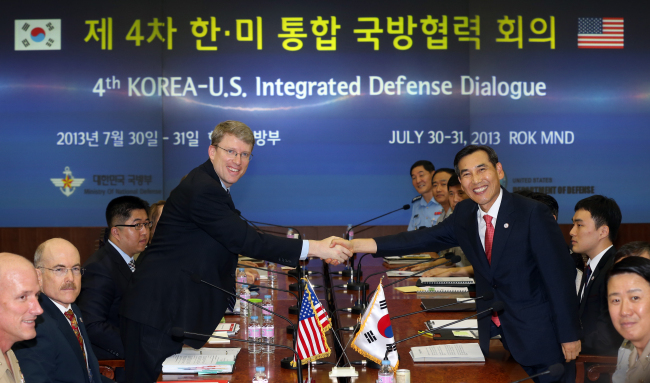Senior defense officials of South Korea and the U.S. discussed the timing of Seoul’s retaking of wartime operational control and North Korea’s increasing security threats during their biannual security dialogue in Seoul Tuesday.
The two-day Korea-U.S. Integrated Defense Dialogue kicked off after Seoul requested in May that Washington review the OPCON transfer, slated for December 2015, amid Pyongyang’s persistent pursuit of nuclear arms and longer-range missiles.
South Korea’s Deputy Defense Minister for Policy Lim Kwan-bin and U.S. Deputy Assistant Secretary for East Asia David Helve led each side.
 |
South Korea’s Deputy Defense Minister for Policy Lim Kwan-bin (right) and U.S. Deputy Assistant Secretary for East Asia David Helve shake hands during the Korea-U.S. Integrated Defense Dialogue in Seoul on Tuesday. ( Yonhap News) |
“We have to develop the spirits of the Korea-U.S. alliance not just for the past six decades but also for the present and future,” said Lim during his opening remarks revealed to the press.
“While sharing the spirits, we will discuss pending bilateral issues and enhance our robust alliance.”
Calls for another delay in the schedule for the OPCON transfer have persisted as conservatives here argue the transfer could weaken America’s security commitment to the South and embolden an increasingly provocative Pyongyang.
Initially scheduled for April 2012, the transfer was first delayed to the end of 2015 in June 2010 amid North Korean provocations, including the torpedoing of the South Korean corvette Cheonan that killed 46 sailors.
Also on the agenda for the KIDD meeting were policy coordination in handling the North and cyber security cooperation, and projects to jointly celebrate the 60th anniversary of the alliance.
The allies are to announce the outcome of their working-level discussions through the KIDD at the annual Security Consultative Meeting slated to take place on Oct. 2 in Seoul.
Launched in 2011, the KIDD is a comprehensive defense meeting between the allies, which integrates the three existing consultative meetings ― the Security Policy Initiative, Extended Deterrence Policy Committee and Strategic Alliance 2015 Working Group.
By Song Sang-ho (
sshluck@heraldcorp.com)





![[Exclusive] Hyundai Mobis eyes closer ties with BYD](http://res.heraldm.com/phpwas/restmb_idxmake.php?idx=644&simg=/content/image/2024/11/25/20241125050044_0.jpg)

![[Herald Review] 'Gangnam B-Side' combines social realism with masterful suspense, performance](http://res.heraldm.com/phpwas/restmb_idxmake.php?idx=644&simg=/content/image/2024/11/25/20241125050072_0.jpg)
